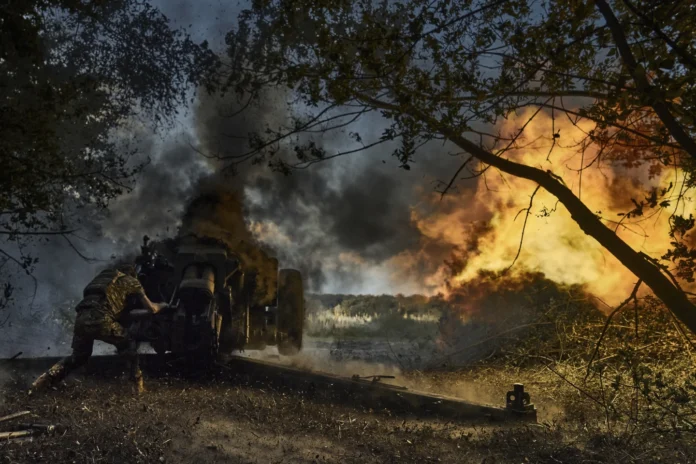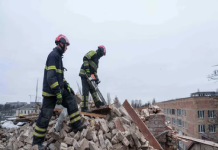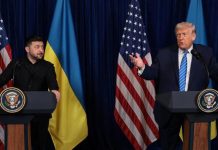MOSCOW (AP)-Russian-installed authorities in Crimea reported shooting down a cruise missile near the city of Kerch. The missile was intercepted by Russian air defenses and did not cause any damage or casualties. However, no specific details were provided regarding the type of missile or its origin.
Authorities in the nearby Russian region of Rostov reported shooting down a missile, which they claimed was of Ukrainian origin. The missile debris caused damage to the roofs of several buildings in the area, but there were no reported casualties.
These missile attacks are part of a series of incidents that have occurred beyond the front lines in Russian regions bordering Ukraine and the annexed Crimean peninsula. Russian officials and Moscow-appointed authorities in Crimea have frequently reported explosions, drone strikes, and cross-border raids, often attributed to Ukrainian saboteurs. However, Ukraine has not publicly claimed responsibility for these attacks.
Last year, the Kerch bridge, a crucial transportation and supply route for Russian forces in Crimea, was severely damaged by a large explosion. The bridge was rendered inoperative for several weeks, impacting Russian military logistics. In a recent social media post, Ukraine’s Deputy Defense Minister acknowledged the attack on the bridge as one of Ukraine’s achievements in the ongoing conflict.
Russian state media and officials strongly condemned the Ukrainian government, labeling it a “terrorist regime” in response to the admission of the attack on the Kerch bridge. The incidents have fueled tensions between the two countries and further strained their already fraught relationship.
One of the defense commanders from the Azovstal steel plant in Mariupol, who had been captured by Russian forces earlier in the conflict, announced his return to the battlefield. The steelworks was the last remaining stronghold of resistance in Mariupol until Russian forces took control of the city. The commander and four others were released in a prisoner exchange and were initially under Turkish protection until the end of the war. However, Ukrainian President Volodymyr Zelenskyy brought them back to Ukraine, and there is no immediate official explanation for this decision.
A Russian missile strike on the city of Lyman in the partially occupied Donetsk region resulted in the death toll rising to nine. Lyman is located near the front line, where intensified fighting between Russian troops and Ukrainian forces has been reported in the forests of Kreminna. The situation remains volatile, and the conflict between the two sides continues.
The missile attacks near Kerch and in Rostov indicate an escalation in the conflict between Russia and Ukraine. These incidents demonstrate a willingness to target areas beyond the immediate front lines, extending the reach of the conflict and potentially increasing civilian casualties and infrastructure damage. The lack of specific details about the origin and type of the missiles adds to the ambiguity surrounding the attacks, making it difficult to determine the exact motives and actors involved.
The acknowledgment by Ukraine’s Deputy Defense Minister of the attack on the Kerch bridge highlights the evolving strategy of the Ukrainian government. By claiming responsibility for attacks on critical infrastructure in Crimea, Ukraine aims to disrupt Russian logistics and project strength in the conflict. This admission signals a shift towards more assertive tactics and indicates Ukraine’s determination to resist Russian control over Crimea.
The strong condemnation from Russian state media and officials, labelling the Ukrainian government as a “terrorist regime,” reflects the Kremlin’s ongoing effort to portray Ukraine as the aggressor in the conflict. These accusations and the publicizing of attacks serve to discredit Ukraine’s claims of self-defense and maintain the narrative that Russia is merely responding to Ukrainian provocations.
The decision by President Zelenskyy to bring back the Azovstal steel plant commander and others to Ukraine raises questions about the conditions of the prisoner exchange and the motivations behind the move. It is possible that Zelenskyy sought to boost morale and demonstrate support for the commander and his comrades by bringing them back to the front lines. However, the lack of an official explanation leaves room for speculation and raises concerns about potential ramifications.
The missile strike in Lyman resulting in casualties highlights the devastating impact of the ongoing conflict on civilians. As fighting intensifies near the front lines, residents in these areas face increased risks to their safety and well-being. The escalation of violence underscores the urgent need for a peaceful resolution to the conflict and the protection of civilian lives.
Overall, these incidents illustrate the volatile nature of the conflict between Russia and Ukraine, with both sides resorting to more aggressive tactics and targeting areas beyond the immediate front lines. The lack of a clear resolution to the conflict and the potential for further escalation underscores the importance of international efforts to promote dialogue and seek a peaceful resolution.






